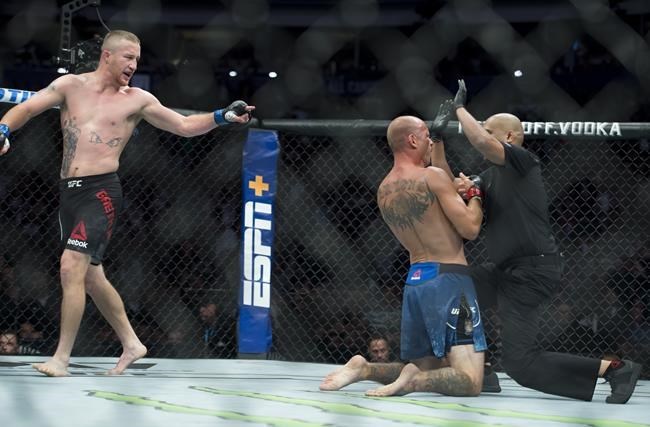TORONTO — With nine homegrown fighters on the 12-fight card, Canada is well represented at UFC 297.
It's the same for the referees. Four of the six working Saturday night are Canadian in Jerin Valel, Todd Anderson, Brian E. Beauchamp and Mathew Rocca. The other two are England's Marc Goddard and American Kevin McDonald.
For Winnipeg's Valel, whose first UFC refereeing assignment was UFC 131 in June 2011 in Vancouver, martial arts have been a constant in his life.
A former fighter on the regional circuit himself, he wrestled at university and is a black belt in Brazilian jiu-jitsu. Valel, who is his mid-40s, continues to train today.
"My cauliflower ear and deviated septum are well-earned," he said cheerfully.
Valel has since served as a referee around the world in the UFC, Bellator, PFL and other promotions. He has also worked as a judge and review official.
Valel dismissed the UFC in its beginning as "barbaric." But as he worked his way up through the belt system in jiu-jitsu, began to appreciate "the human chess that MMA is."
He started coaching and cornering fighters, eventually getting into refereeing at the insistence of Manitoba Boxing commissioner Maureen Black who needed another official for a fight card. That led to more and more referee assignments.
Now a certified trainer for judges and referees, Valel teaches MMA courses around the world and is part of the Association of Boxing Commissions (ABC) rules and regulations committee.
Away from officiating, Valel is a business/technology consultant these days. He previously was part of the Manitoba government, most recently deputy minister of economic development, investment and trade. That job ended after the Manitoba election in October.
His resume also includes close to 10 years at Bell MTS, where he rose to the position of director of digital.
Valel enjoys the challenge of MMA, saying if boxing is the sweet science, MMA is rocket science. "It's always evolving," he added.
"One of the reasons I'm on the mats to this day, for BJJ and kick-boxing (training), is to keep current," he said.
"There's so many permutations and counters and movements and strategies in this game. It's wonderful to get lost in," he added.
Referees keep up through training sessions, both live and virtual. Valel has also worked with commissions, officials and TV commentators as well as fighters and coaches.
Valel, who is married with a six year-old daughter, recently was in the Philippines to teach an MMA course.
Licensed to work in Nevada, Valel also serves as a review official there — essentially the equivalent of soccer's video assistant referee. He'll sit at the Nevada State Athletic Commission table with a TV screen with access to eight cameras, reviewing the action as needed.
He is a fixture at major Canadian shows, including UFC 289 in Vancouver in June (the UFC's last card in Canada) and UFC 231 in December 2018 (the promotion's last show in Toronto).
These days, he restricts his officiating to some two times a month, mostly with the UFC and other large promotions.
No matter where, it's a high-stakes gig.
"We're under the microscope, as we should be," said Valel. "We have very impactful jobs, both for fighter safety and for their pay. Usually the losing fighter is upset in some way, whether it's with us as officials or the promotion."
In promotions like the UFC, a loss usually means the fighter purse is halved.
Valel says he is constantly learning on the job.
"Of course, in a hundredth of a second, do I make the wrong decision at times? When looking back at video, of course I see something I didn't see, I'm not in the right position, I need to move to this position, oh I missed that. I wish I knew that at the time."
Review officials, where allowed, help. There are also post-mortems with the commission, usually with a representative from the promotion as well. In the UFC's case that is usually the well-respected Marc Ratner, the promotion's vice-president of regulatory affairs and a former executive director of the Nevada State Athletic Commission.
Those discussions may trigger a followup training session run by the commission to go over a specific issue or situation. Often such debates go below the radar.
"The promotions and the commissions prefer that we don't interact with fans or media … specifically to talk about specific circumstances for a variety of reasons ," said Valel, who sought permission from both the Ontario Athletics Commission and the UFC to speak to The Canadian Press.
Once the cage door closes, Valel says he shuts out the outside noise to focus on the two athletes under his charge. Getting in that zone has taken time and experience.
"I'm far better at it now than I used to be. That's true of everyone … But from Day 1 you have this deep sense of obligation to these fighters … to enforce the rules, to be fair, to not interfere, to not be a distraction."
"This is bigger than me," he added. "I need to be at my sharpest and I want to make sure I'm fair — fair as a ref and a judge but also safe as a ref. That I'm protecting their safety long-term."
---
Follow @NeilMDavidson on X platform, formerly known as Twitter
This report by The Canadian Press was first published Jan. 19, 2024
Neil Davidson, The Canadian Press



